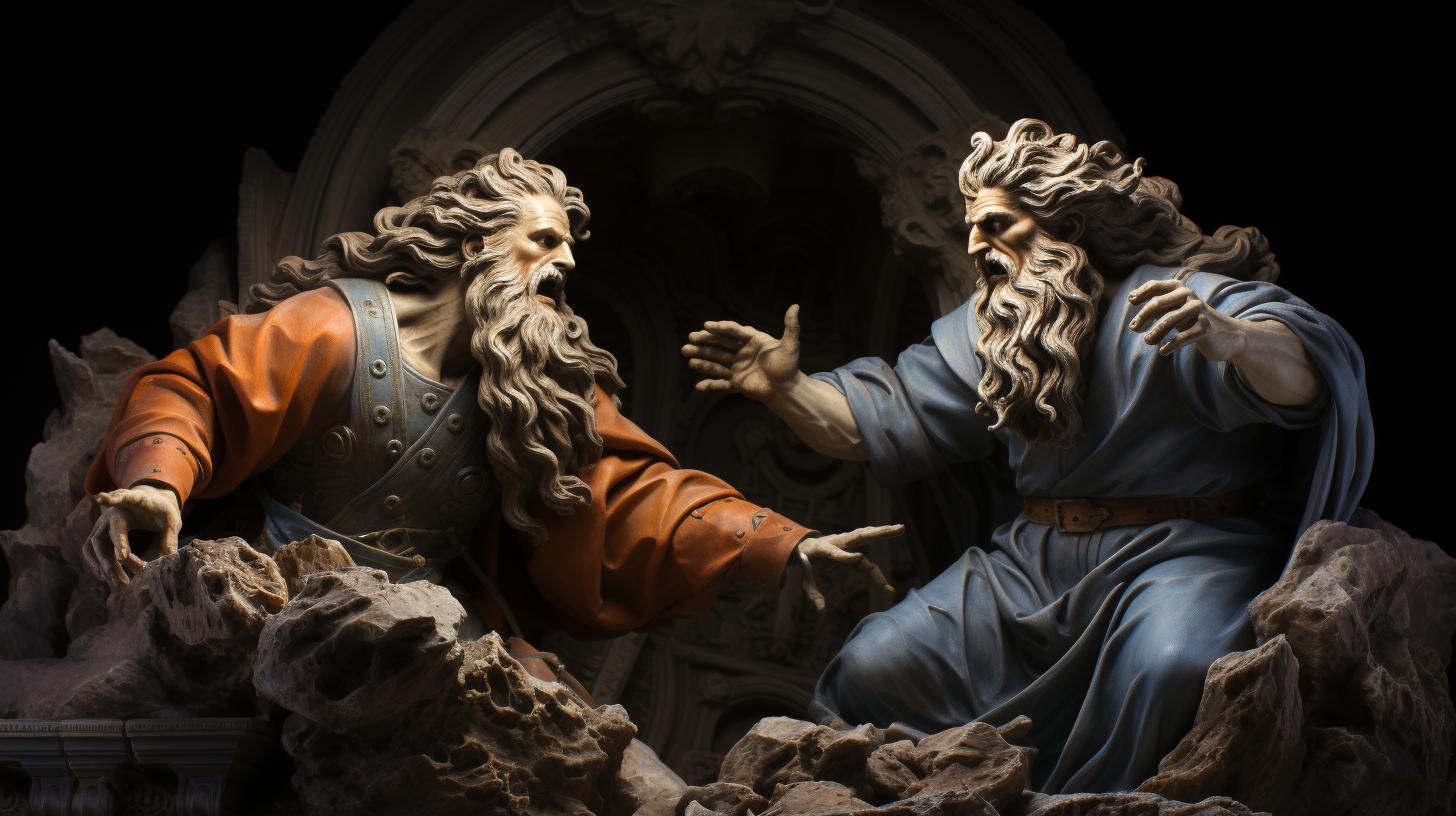Metis Greek Goddess: Unraveling the Mysteries of the Titaness in Greek Mythology

The Greek goddess Metis holds a significant place in ancient Greek mythology. As a Titaness, Metis embodied wisdom, cunning, and strategic counsel. She was an influential advisor to Zeus during the Titanomachy, and her role in helping Zeus overthrow Kronos is noteworthy.
Despite being swallowed by Zeus due to a prophecy, Metis continued to impact Greek mythology and culture. This article explores Metis’ origins, her complex relationship with Zeus, her presence in Greek worship, and her enduring legacy in philosophy and visual representations.
Discover the captivating world of Metis, the Greek goddess of good counsel and wisdom.
The Origins of Metis Goddess in Greek Mythology
The ancient Greek religion and mythology form the foundation of countless fascinating tales, and in the pantheon of gods and goddesses, Metis holds a significant place. Exploring the origins of Metis goddess allows us to delve into the rich tapestry of ancient Greek beliefs and theogony, shedding light on the complex world of mythical beings.
The Ancient Greek Religion and Mythology
The ancient Greeks practiced a polytheistic religion, where a multitude of gods and goddesses were worshipped and revered. These deities embodied various aspects of human existence, reflecting the Greeks’ beliefs, values, and aspirations.
Mythology played an essential role in explaining natural phenomena, human experiences, and the mysteries of the universe.
Theogony: Hesiod’s Account of the Gods
One of the most prominent surviving accounts of Greek mythology is found in Hesiod’s Theogony. This ancient poem details the genealogy and hierarchy of gods and goddesses, chronicling their origin stories and interactions.
The Theogony provides valuable insights into the birth of Metis and her place within the divine pantheon.
Understanding the Titans in Greek Mythology
Before exploring Metis’ birth, it is crucial to grasp the concept of the Titans in Greek mythology. These primordial beings were ancient gods who preceded the Olympians. The Titans, including Metis, were born from the primordial entities Okeanos and Tethys and played significant roles in shaping the cosmos.
The Birth and Parents of Metis Goddess
Metis, the daughter of Okeanos and Tethys, emerged as one of the Okeanides and eventually became the Titaness of good counsel, planning, cunning, and wisdom. Her birth and lineage confer an aura of wisdom and power, setting the stage for her subsequent role within the Greek pantheon.
Metis’ Role as Zeus’ Counselor and Strategist
In the midst of the Titanomachy, the great war between the Titans and the Olympians, Metis assumed a crucial role as Zeus’ advisor and strategist. With her astuteness and planning abilities, she played an instrumental part in helping Zeus overthrow Kronos and secure his reign as the king of the gods.
The tale of Metis’ involvement in Zeus’ ascension to power sets the stage for the complex relationship between the two deities and shapes Metis’ identity as a pivotal figure within Greek mythology.
Metis and Zeus: A Complex Relationship
Metis’s relationship with Zeus is a fascinating and intricate one. The god’s decision to swallow Metis, the Titaness of wisdom and counsel, marked a significant turning point in their connection.
Zeus’ Decision to Swallow Metis
In a bid to maintain his power, Zeus swallowed Metis whole, fearing the birth of a child who would surpass his own might. This act of absorption symbolizes the assimilation of Metis’s wisdom and cunning into Zeus’s character, becoming an inseparable part of his own nature.
Metis’ Prophecy and the Birth of Athena
Metis’s role as a prophetess proved crucial in the birth of Athena. She foresaw a future where her daughter would be even more potent than Zeus himself. To prevent this, Zeus took the drastic step of consuming Metis, unknowingly carrying their unborn child within him.
Athena: The Goddess Without a Mother
Athena, the goddess of wisdom and strategic warfare, is often depicted as being born without a mother. Metis’s absorption by Zeus resulted in Athena’s birth directly from her father’s head.
This unusual birth emphasized Athena’s connection to wisdom, inherited directly from her swallowed mother.
The Influence of Metis on Zeus’ Reign
Despite being fully assimilated by Zeus, Metis’s influence persisted throughout his reign. The wisdom and cunning she possessed continued to shape Zeus’s decisions and enlightened his strategic thinking. Metis’s essence provided a solid foundation for Zeus’s rule as the king of gods, enabling him to make sound judgments and overcome challenges.
Metis in Greek Culture and Worship
In ancient Greece, Metis enjoyed widespread veneration through various panhellenic cults. These cults were dedicated to honoring and worshipping the goddess’s wisdom, cunning, and strategic counsel. Metis’ reputation as the Titaness of good advice and planning resonated with the Greeks, who sought her blessings for making wise decisions in their personal and public lives.
Devotees would gather in temples and sanctuaries, offering prayers, sacrifices, and gifts to show their devotion to Metis. These rituals were essential in establishing a strong connection between mortals and the goddess, seeking her guidance and blessings in matters of intellect, planning, and strategic thinking.
Metis’ influence in these cults extended beyond her association with Zeus, solidifying her position as an esteemed deity in Greek culture.
Metis in Regional Cults: Zeus Velchanos and Others
While Metis was widely worshipped in panhellenic cults, she also held a significant presence in regional cults, particularly in associations with Zeus Velchanos and other local deities. These regional cults worshipped Metis alongside other gods and goddesses, emphasizing her role as a divine entity who contributed to the well-being and prosperity of specific regions.
Zeus Velchanos, the local deity worshipped in Crete, had close ties with Metis. Their combined worship symbolized the harmonious integration of wisdom, cunning, and divine power. Similarly, other regional cults recognized Metis as a vital figure who influenced various aspects of life, ranging from intellectual pursuits to strategic planning, depending on the specific traditions and importance given to her role in each region.
Metis’ Associations with Oracles and Foreign Deities
Metis’ wisdom and connection to divine knowledge made her closely associated with oracles, such as Dodona and Siwa. These oracles served as sacred sites where worshippers sought prophetic guidance and advice, often believed to be channeled through the divine influence of Metis.
Furthermore, Metis was occasionally identified or merged with foreign deities to create syncretic relationships. For example, her association with Helios, the Greek god of the sun, showcased the assimilation of divine attributes across different cultures.
This amalgamation of deities demonstrated the extent of Metis’ influence and her ability to bridge cultural divides within Greek religious practices.
Metis in Philosophy and Modern Interpretations
Metis’ Influence in Ancient Greek Philosophy
Metis, the Greek goddess of wisdom and strategy, held significant influence in ancient Greek philosophy. Her portrayal as a cunning and clever deity resonated with philosophers who admired her strategic thinking and intelligence.
Philosophers like Heraclitus and Parmenides explored the concept of divine wisdom attributed to Metis and incorporated it into their philosophical theories. Metis’ embodiment of intellectual prowess and astuteness contributed to the development of philosophical thought in ancient Greece.
Metis’ Symbolism in Contemporary Thought
Metis’ symbolism continues to inspire contemporary thought and intellectual discourse. With her association with wisdom, cunning, and strategic planning, Metis serves as a powerful symbol in various fields, including business, leadership, and problem-solving.
Her attributes of foresight and adaptability resonate with individuals seeking innovative solutions and effective decision-making. Metis’ symbolism in contemporary thought highlights the timeless relevance of wisdom and resourcefulness in navigating complex challenges in today’s world.
Metis in Biblical References and Interpretations
Although not explicitly mentioned in religious texts, references to Metis can be seen in biblical interpretations and related discussions. Metis’ wisdom and her role as Zeus’ counselor parallel the biblical concept of divine wisdom and guidance.
Scholars and theologians have drawn comparisons between Metis and biblical figures such as Solomon, known for their exceptional wisdom and discernment. Metis’ presence in biblical interpretations serves to enrich the understanding of divine wisdom and its significance across different religious and cultural contexts.
Explore the timeless wisdom and philosophical significance of Metis, the revered Greek goddess, extending her influence from ancient philosophers to contemporary thought and even biblical interpretations.
Visual Representations and Iconography of Metis
Visual representations of Metis in ancient Greek art offer a glimpse into the imagery and symbolism associated with the goddess.
These depictions not only showcase the physical appearance of Metis but also convey her attributes and significance in Greek mythology.
Depictions of Metis in Ancient Greek Art
Ancient Greek art often portrayed Metis as a regal and wise goddess. In vase paintings, she is shown wearing a crown or a high, elaborate headdress, signifying her divine status. Her attire typically consists of flowing garments that enhance her majestic appearance.
Artistic representations also emphasize Metis’ attribute of wisdom. She is often depicted holding a scroll or a book, symbolizing her role as the goddess of wisdom and good counsel. Sometimes, she is shown alongside Zeus, highlighting her advisory role in their relationship.
Metis’ Representation in Sculptures and Pottery
Metis’ depiction in ancient sculptures and pottery reveals her association with strategic thinking and planning. Sculptures often showcased her seated, deep in thought, suggesting her role as a cunning strategist. These sculptures capture her intelligence and ability to devise plans that shape the course of events.
In pottery, Metis is depicted in various scenes, including her interactions with other deities or her involvement in significant mythological events. These intricate details in both sculptures and pottery provide valuable insight into the visual representation of Metis and her importance in Greek culture.
Symbols and Attributes Associated with Metis
- Crown or Elaborate Headdress: Symbolizes Metis’ divine status and regal presence.
- Scroll or Book: Represents her wisdom and role as the goddess of good counsel.
- Seated Position: Signifies her strategic thinking and planning abilities.
- Interaction with Zeus: Highlights her role as his counselor and advisor.
These symbols and attributes associated with Metis in visual representations further enhance our understanding of her multifaceted role and divine characteristics.
Intricate details in the artwork, such as hand gestures and facial expressions, provide nuanced interpretations and further deepen our appreciation for the representation of Metis in ancient Greek art.
Metis Greek Goddess: Enduring Legacy and Influence
Metis, the Greek goddess of wisdom and cunning, has left an indelible mark on Greek mythology and culture.
Her enduring legacy can be seen in various aspects, including her impact on Greek mythology and culture, her influence on literary works such as the Iliad, and the appreciation of her wisdom and cunning.
Metis’ Impact on Greek Mythology and Culture
Metis played a significant role in Greek mythology, particularly as the counselor and strategist of Zeus during the Titanomachy. Her wise counsel and planning were instrumental in the downfall of the Titans and the establishment of Zeus’ reign.
Metis’ influence extended beyond the realm of warfare, as she was also associated with good advice and practical wisdom in various aspects of life.
Metis’ Legacy in Literary Works: Iliad and More
Metis’ impact can be seen in the realm of literature, particularly in prominent works like the Iliad.
Although Metis herself doesn’t appear as a central character in these texts, her influence permeates the narratives. Her strategic and cunning nature is reflected in the characters and their actions, showcasing the timeless significance of her wisdom in storytelling.
Appreciating the Wisdom and Cunning of Metis
Metis’ wisdom and cunning are qualities that continue to captivate and inspire. Her ability to outsmart even the most powerful gods is a testament to her remarkable intellect. Metis represents the power of knowledge and strategic thinking, reminding us of the value of wisdom in navigating the complexities of life.
By appreciating Metis’ qualities, we gain insight into the importance of astuteness and planning in achieving our goals.
.




















